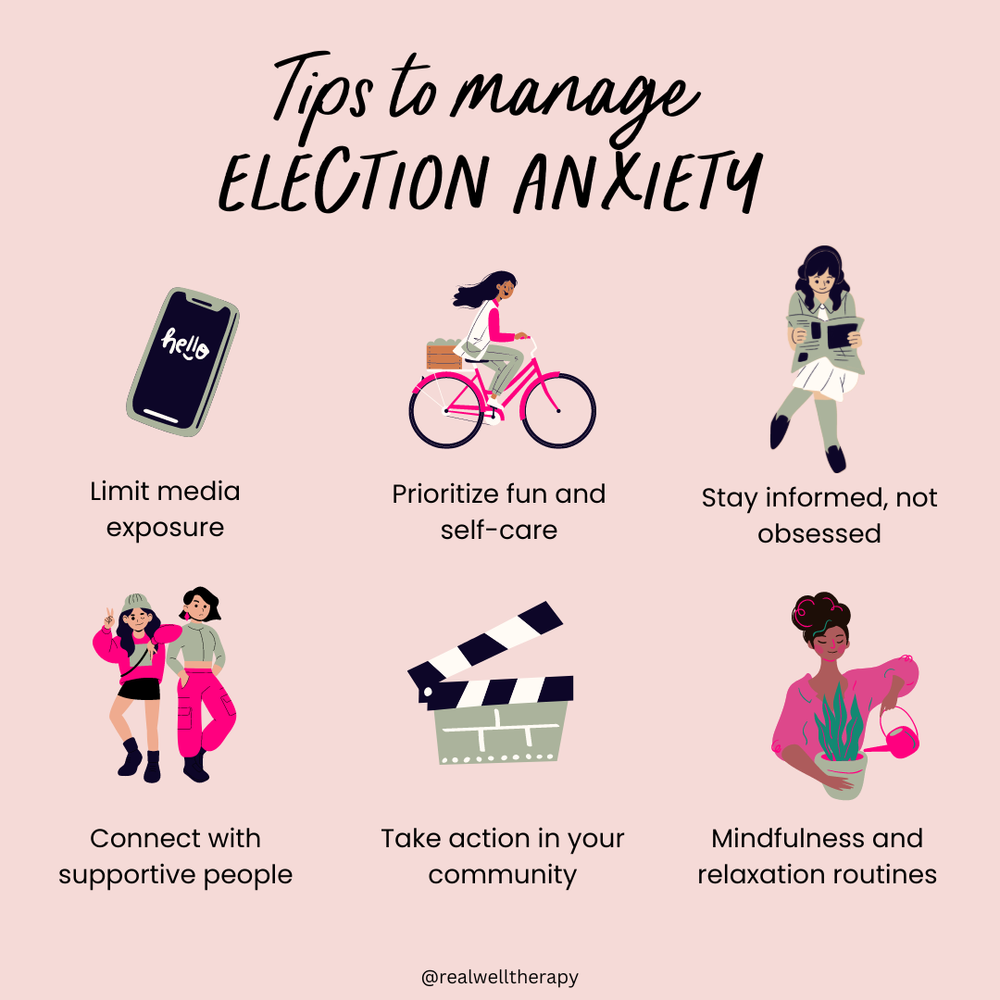Understanding and Managing Election Anxiety: A Guide for Women and Teens
Here's the thing: caring about what happens in our country is good. It means you're engaged and understand the impact politics can have on our daily lives. But when that care turns into overwhelming worry? That’s when it helps to learn how to deal with election anxiety in a healthier way.
Let's explore how we can stay informed and engaged without letting election stress take over our lives.
Why Elections Can Be So Stressful: Understanding Election Anxiety
Election anxiety is a unique blend of stress and worry that pops up around political elections. It's about more than who wins or loses but how the results might affect your life, community, and the issues you care about. Think of it like waiting for your exam results but on a much bigger scale.
Let's break down what makes election season particularly stressful:
Uncertainty about the future: Will healthcare policies change? What about job prospects or housing affordability?
Information overload: Between 24/7 news cycles, social media, and endless polls and predictions, it's easy to feel overwhelmed.
High stakes: Elections aren't just about politics – they're about values, rights, and the direction of our society.
Feeling of powerlessness: Despite our individual votes, the outcome is ultimately out of our control, which can deepen feelings of existential dread about one's influence and efficacy in the world. (Learn more about existential anxiety in this blog.)
Potential conflicts: Worrying about disagreements with friends or family – those with different political views and especially those also overwhelmed by election season – can add another layer of stress.
Identity and representation: Concerns about policies affecting specific demographics can amplify anxiety. For women, this might involve reproductive rights or workplace equality. Teens might worry about education policies or climate change legislation that will shape their future. Climate anxiety is another very real phenomenon, and it happens to be deeply intertwined with election anxiety. Both reflect a shared fear of future outcomes and their long-term impacts - you can read more about climate anxiety here.
First-time voter jitters: For many teens and young adults, their first time voting can feel exciting yet overwhelming, adding to election stress.
Signs and Symptoms: Is Election Anxiety Affecting You?
What makes election anxiety unique is its tendency to intensify as election day approaches. You might obsessively check news updates, lose sleep over "what-ifs," or feel constant dread.
Wondering if election anxiety is creeping into your life? Let's take a quick inventory. As you read through these symptoms, check in with yourself. How many of these sound familiar?
Trouble sleeping, especially as election day approaches
Feeling on edge or irritable when discussing politics
Obsessively checking news or polls
Difficulty concentrating on daily tasks due to election worries
Experiencing mood swings based on the latest political news
Constant worry or rumination about election-related "what-ifs"
A sense of impending doom about potential election outcomes
Avoiding social situations to dodge political discussions
Tension with friends or family members over political disagreements
Feeling physically anxious (stomach butterflies, rapid heartbeat) when you read or hear about the election
Remember, everyone experiences anxiety differently. You might have a few of these symptoms, or you might have many.
The good news? Recognizing what's going on, why elections trigger these feelings, and how it's interfering with your life is the first step to managing it.
Tips to Manage and Cope with Election Anxiety
Here are some practical strategies to help you cope with election stress:
Limit media exposure: Set specific times for checking news and stick to reliable, unbiased sources.
Prioritize fun and self-care: Try to get good sleep, exercise, and engage in activities that make you feel lighter and more grounded.
Stay informed, not obsessed: Focus on understanding key issues rather than following every poll or prediction.
Connect with supportive people: Share your feelings with friends or family who listen without judgment – and especially not debate.
Take action: Channel anxiety and doubts into impactful activities like volunteering or participating in local community efforts.
Mindfulness and relaxation: Try breathing exercises or meditation to center yourself.
Remember, it's okay to step back when you need to. It's just as important to stay informed of our mental environment as our political one. It's something we can more directly control.
Bottom Line
Election anxiety is real, and it's okay to feel it. Remember, caring about the outcome shows you're engaged in your future. The key is finding a balance between staying informed and protecting your mental health.
By recognizing the signs and learning how to cope with election anxiety, you can stay engaged without sacrificing your peace of mind. You can manage your response to the election, even when you can't control the outcome.
Therapy Can Help
If you're finding that election anxiety is overwhelming or interfering with your daily life, know that professional support is available. As a therapist specializing in anxiety for women and teens in Austin, Texas, I'm here to help you develop personalized strategies to manage election-related stress and build resilience.
Don't let election anxiety hold you back. Take the first step towards peace of mind – call 512-686-7009 or schedule a free online consultation. Together, we can work on keeping you informed and engaged without sacrificing your mental well-being.
Don’t miss out! Sign up below for blog updates.
(Don’t worry, I won’t spam you or share your information).


